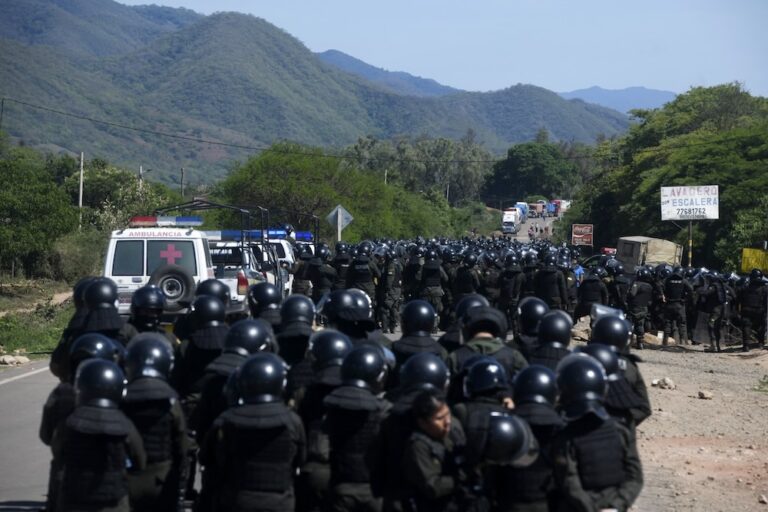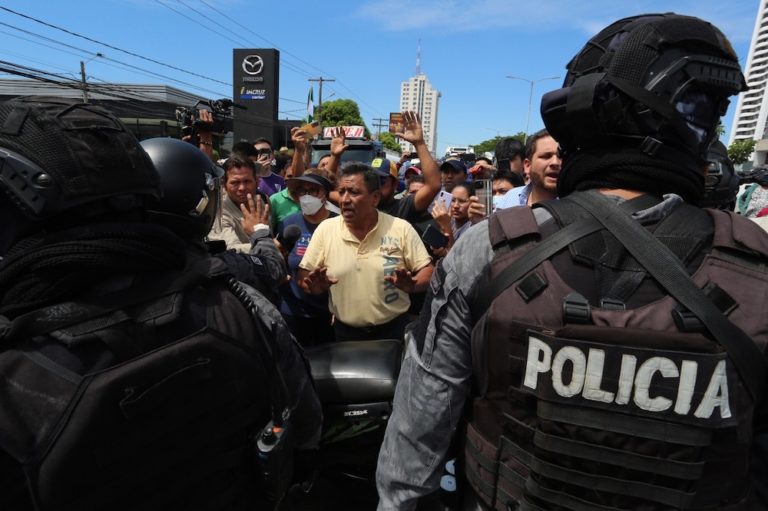(IPYS/IFEX) – In a week of violent confrontations between supporters and opponents of President Evo Morales’s government in the departments of Santa Cruz, Cobija, Tarija and, to a lesser degree, in the city of La Paz, several media outlets and journalists have been the target of threats and attacks. On 9 September, approximately 200 youths […]
(IPYS/IFEX) – In a week of violent confrontations between supporters and opponents of President Evo Morales’s government in the departments of Santa Cruz, Cobija, Tarija and, to a lesser degree, in the city of La Paz, several media outlets and journalists have been the target of threats and attacks.
On 9 September, approximately 200 youths who oppose the national government stormed into the state-owned television station Canal 7 Televisión Boliviana’s facilities in Santa Cruz. The mob burst into the building, destroyed equipment and furniture, stole cameras and documents and assaulted Mario Mamani, a camera operator who was on duty guarding the premises. The youths’ justification for the attack was that the station is used by the government for political purposes.
As a result of the attack, Canal 7’s broadcasts from Santa Cruz to the rest of the country were suspended indefinitely. Canal 7 press director, Edgar López, blamed the attack on the Santa Cruz Youth Union (Unión Juvenil Cruceñista) and the Pro Santa Cruz Civic Committee, both of which oppose the national government.
On the same day, the Patria Nueva radio network’s facilities were attacked, allegedly by government opponents who threw an explosive device at the building, resulting in a fire in the main entrance.
In statements made to several media outlets, the president of the Pro Santa Cruz Civic Committee, Branko Marinkovic, denied that his organisation or other related groups were responsible for the attacks and said that they were carried out by groups of vandals.
On 10 September, in San Ignacio de Velasco, a city to the north of Santa Cruz, journalist Fernando Kenning told the National Journalists’ Association (Asociación Nacional de Periodistas, ANP) that he received death threats from members of the local civic committee after he covered an occupation of government facilities by groups opposing Morales.
On 11 September, the Tropical radio station, located in the Plan Tres Mil district of Santa Cruz, was attacked by groups with links to the governing party. During the attack, radio operator and programme host Carlos Barbery jumped from a second floor window in an attempt to escape the attackers. He broke his right leg in the fall and had to be hospitalised.
A few hours later, Vivian Abastoflor, a journalist with the PAT private television network, and her camera operator, Jorge Alvis, were attacked by community members who support the national government while they were covering the conflict in the village of Yapacaní, Santa Cruz.
Journalists for the UNO and ATB television networks were also attacked with sticks and stones by vendors who support Morales while they were covering acts of vandalism in a market in Santa Cruz.
Fernando Suárez, Radio y Televisión Sudamericana’s press director, told the ANP that he received anonymous threats warning him that his media outlets’ headquarters would be taken over by groups that oppose the government.
In the village of Camiri, south of Santa Cruz, the Milenium, Ñandutí and El Chaco radio stations announced they were suspending their daily broadcasts due to a lack of protection and because they had received threats that their facilities would be seized by members of the local civic movement.
In Montero, a town also located south of Santa Cruz, the ANP confirmed that the local “Nuevo Norte” newspaper, along with a radio station affiliated with the state-owned Patria Nueva network and a local television station that is a member of the state-owned Canal 7 Televisión Boliviana, were forced to suspend their activities after their journalists received death threats and their headquarters were seized.
El “Nuevo Norte” obtained information from Florencio Porco, who is in charge of the state-owned radio station in Montero. Porco said that groups linked to the government of Santa Cruz were preparing to take over the station.
On 10 September, in La Paz, a group of journalists from privately-owned media outlets were harassed by members of the Popular Civic Committee, which has links to the government. The civic committee members accused them of distorting the news to be against Morales and threatened to set fire to their media outlets’ headquarters.
The same group then went to the Unitel television network building and the headquarters of the PAT and ATB television stations to keep watch in front of the buildings. A police presence prevented any acts of violence.
Finally, the vehicle windshield of a mobile unit belonging to the Bolivisión television network was shattered while its journalists were covering the conflict. The journalists managed to escape and record the events from a hidden location.
Updates alerts on opposition attacks on state-owned media: http://ifex.org/es/content/view/full/97012


